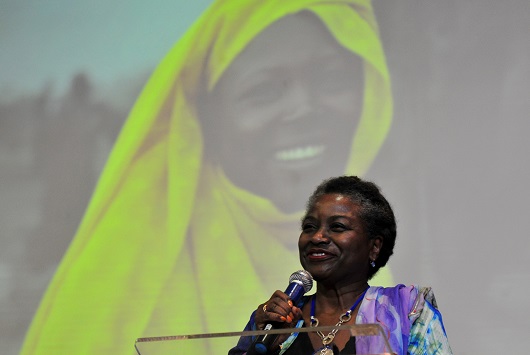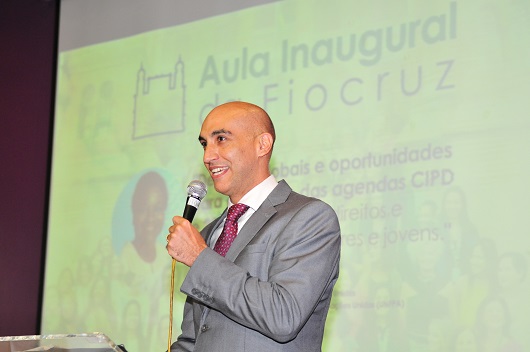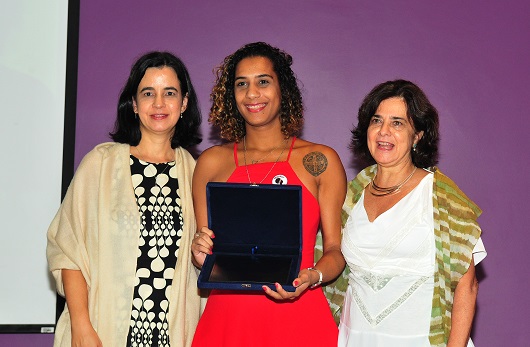UN Under-Secretary-General opens Fiocruz school year
01/04/2019
Ricardo Valverde (AFN)
The opening of the academic year of Fiocruz included a conference by the UN Under-Secretary-General and Executive Director of the United Nations Population Fund (UNFPA), Natalia Kanem. With the theme "Global Challenges and Opportunities for the Advancement of the ICPD and 2030 Agendas: Ensuring Rights and Choices for Women and Youths," the conference filled the auditorium of the Museum of Life at the Foundation's Manguinhos campus, on March 22. Before the inaugural lecture, there was a tribute to councilwoman, Marielle Franco, who was murdered a little over a year ago, and a presentation by the group "Filhas de Maria", formed by four women from Manguinhos, the district where Fiocruz is based, who, through their music, sing about the daily life of the region, and speak out against racism and chauvinism.

Natalia Kanem said she wants more collaboration with Fiocruz, focusing on SDG and the rights of women and young people. She thanked Brazil for financial and technical support (photo: Peter Ilicciev)
The Paraguayan Minister of Health, Julio Mazzoleni, who was on an official visit to Brazil, was the first to speak. He said he was impressed by the Fiocruz’s characteristics and its successful melding of tradition and modernity. After this first part, the opening panel was convened, which included the representative of the Fiocruz Graduates Association, Helena de Oliveira, the vice president of the Fiocruz Science, Technology, Production and Innovation in Public Health Workers Union (Asfoc-SN), Mychelle Alves Monteiro, the consultant on Gender and Health of Opas in Brazil, Ana Gabriela Sena, the Unfpa representative in Brazil, Jaime Nadal, the vice-president of Education, Information and Communication of Fiocruz, Cristiani Vieira Machado, and the president of the Foundation, Nísia Trindade Lima.
Helena Oliveira reminded the students of Fiocruz that academic life is not limited to productivity and that it is the fight for access and equality that makes this a graduation course with greater quality. She urged them to become actively involved. Mychelle Alves defended the argument of Asfoc-SN for social policies aimed at the well-being of the population, especially the more disadvantaged, and for the development of project for a country that is inclusive, sovereign and sustainable. Cristiani Machado defended the Unified Health System (SUS), equality and social commitment and recalled that inequality affects mainly women and young people. "Next week we will launch five important calls, one of which is for girls in science."

Paraguayan Minister of Health Julio Mazzoleni said he was impressed with Fiocruz's characteristics and its successful fusion of tradition and modernity (photo: Peter Ilicciev)
For Ana Gabriela Sena, Agenda 2030 requires amendments and must create opportunities for all. “For PAHO, gender equality is fundamental. We have to empower women, without leaving anyone behind”. Jayme Nadal stated that Unfpa and Fiocruz have a solid relationship and a tradition in cooperation in public policies and with well-informed dialogue. Fiocruz's president, Nísia Trindade Lima, underlined the joy and honor of receiving Under-Secretary-General Natalia Kanem and declared that the Foundation is committed to the 2030 Agenda, which led the institution to set up an internal working body to care for the theme, seeking to achieve the Sustainable Development Goals (SDG). "The eradication of poverty in all its forms and dimensions, including extreme poverty, is the greatest global challenge and an absolutely necessary prerequisite for sustainable development," she said.
Following this, Nísia paid tribute to the memory of Marielle Franco delivering a commemorative plaque to the councilwoman’s sister, Anielle Franco. The president also paid homage to two recently-deceased employees: the ex-president of Fiocruz, Luiz Fernando Ferreira, and the scientific consultant of the Institute of Immunobiology Technology (Bio-Manguinhos/Fiocruz), Reinaldo Martins.

President of Fiocruz, Nísia Trindade Lima, honored the memory of Marielle Franco handing a plaque to the councilwoman's sister, Anielle Franco (photo: Peter Ilicciev)
After the tributes and initial talks, the conference with Natalia Kanem began. She said that she would like to see further collaboration with Fiocruz, focusing on SDG and the women and young people rights, and thanked Brazil for its financial and technical support. "Human rights are the basis for peace and prosperity and form the pillars of the UN." Kanem said that since 1994, when the International Conference on Population and Development (ICPD) took place in Cairo, the foundations for sexual and reproductive rights are being established around the world. "Twenty-five years later, it's still the spirit of that conference that encourages and drives us. People, especially women, need to take the leading role in their own lives, as autonomous human beings. That is why we need more and more education, including sexual education, so that the tragedies that are repeated around the world may be eliminated”.
She said there was reason to celebrate. Infant mortality, for example, fell from 143 to 65 per thousand. The number is still high, but the progress is undeniable. But there is much to do. "About 300,000 women die annually due to lack of adequate health conditions. That’s 830 women per day, many of them young girls. Worldwide, 15 million underage girls live forced marriages with older men and one in three women suffered or will experience some form of violence, and one in five girls is already married before age 18, with 12% marrying before the age of 15”, commented Kanem, who also referred to the increasingly common use of rape in situations of war and military conflict.

Opening of the academic year of Fiocruz discussed 'Global challenges and opportunities for the advancement of CIPD and 2030 agendas' (photo: Peter Ilicciev)
The UN representative also mentioned genital mutilation (extraction of the clitoris), which affects about 200 million women. A number that, according to the Under-Secretary-General, will increase this year by another 4 million women. "In partnership with Unicef, we have held campaigns in many countries for this custom to be eradicated. We need to give women a voice, give them the power to choose what they want for their lives. In smaller families, the woman is the sovereign. Every year, around 7 million babies are born whose mothers are young girls”.
The Under-Secretary-General criticized what she called a "collective inability" to address these issues. "In Brazil, for example, the number of young people aged 15 to 19 years with HIV has doubled in recent years. This has much to do with the political polarization that is inhibiting public policies. For this reason, it is vital that we return to the narrative, based on scientific evidence. The future depends upon investment in women and young people. Millions of young girls do not know how to read and consequently, do not study. How are they going to change their lives? We want zero inequality, zero infant and maternal mortality, and zero gender violence”.

In a visit to Fiocruz, UN Under-Secretary-General and Executive Director of the United Nations Population Fund (UNFPA), Natalia Kanem, also spoke at the inaugural lecture of the institution (photo: Peter Ilicciev)
Around the world, according to Kanem, only half of women have control over reproductive and sexual issues. "It is therefore necessary that we address the causes of this problem by not only empowering women and girls, but also involving men and boys. Young people need to have this knowledge before they become sexually adult. School is the appropriate space to present this knowledge to them. We also need to reform the legislation, protecting women and young people. Natalia noted that the challenge belongs to everyone and that only in this way will the disadvantaged groups have a voice and a leading role. “That way, women will be able to make their own decisions and defend their rights."
International Conference on Population and Development
The United Nations Conference on Population and Development (ICPD), held in Cairo in 1994, resulted in the elaboration of an agenda (ICPD), with a common commitment to achieve sustainable development with equity for all, by promoting human rights and dignity, support for family planning, sexual and reproductive health and rights, promotion of gender equality, promotion of equal access to education for girls and elimination of violence against women, among other things.
On the 20th anniversary of the ICPD, the UN General Assembly, in a special session, called on countries to fulfill the commitments made in Cairo and address growing inequalities and emerging challenges as outlined in the ICPD Beyond 2014 Global Report, released by the United Nations, which places human rights and individual dignity at the heart of development.


